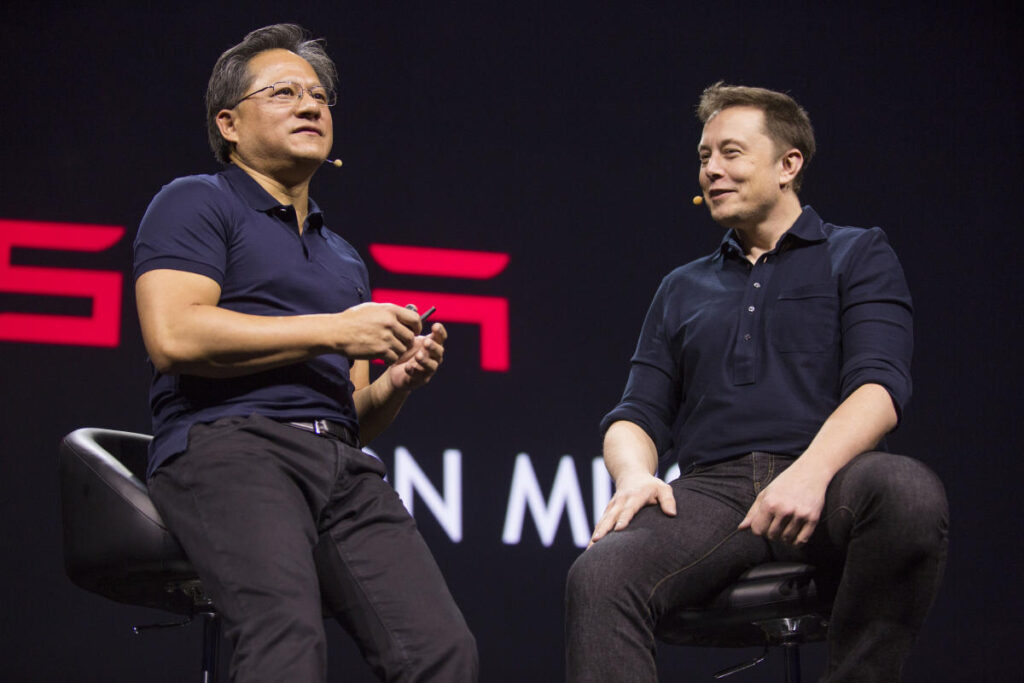Nvidia (NVDA) CEO Jensen Huang believes Tesla's (TSLA) fully self-driving (FSD) system is the most advanced system available today. It's also a coincidence that his FSD at Tesla is powered by his Nvidia chip.
“Tesla is far ahead in self-driving cars,” Huang said in an exclusive interview with Yahoo Finance.
“One of the really innovative things about Tesla's fully self-driving version 12 is that it's an end-to-end generative model,” Huang added.
“Learn by watching videos (surround video), learn how to drive end-to-end, use generative AI to predict and understand routes, and learn how to steer your car. This technology is truly revolutionary. target, [Tesla’s] It's incredible what you're doing. ”
Tesla's latest FSD, version 12, is currently in beta mode and was rolled out with a 30-day free trial to new owners earlier this year. FSD currently costs $99 per month, or $8,000 upfront. Tesla reported in April that FSD has accumulated more than 1.3 billion miles driven since its March 2021 debut.
FSD is still considered a Level 2 autonomous system, which means it requires supervised use and is subject to recalls and government investigations into its functionality.
In the first quarter, NVIDIA reported automotive sales of $329 million. This is a small amount compared to the company's data center business's $22.6 billion in sales, but it was up 17% from the previous quarter and 11% from a year earlier.
Nvidia CFO Colette Kress said on the company's earnings call that she expects automotive to become “the largest enterprise vertical market in our industry.” [the] Data Centres [segment] The company says it has the potential to generate billions of dollars in business this year.
Most of NVIDIA's data center revenue, which reached $22.6 billion in the first quarter, came from consumer Internet customers. Cloud providers, so-called hyperscalers such as Amazon (AMZN), Alphabet (GOOG, GOOGL), and Microsoft (MSFT) account for “the mid-40% range” of this segment's revenue.
Huang also told Yahoo Finance that he expects that one day “all cars will have some degree of self-driving capability.” Its development requires enormous computing power.
“This technology is very similar to that of large-scale language models, but it requires a very large training facility,” Huang said of Tesla's FSD system. “The reason is that we have video, and the data rate of video, the amount of data of video, is very high.”
For example, to increase Tesla's ability to process that amount of data, Nvidia says it helped the company expand its FSD training AI cluster to 35,000 Nvidia Hopper H100 GPUs.
In addition to Tesla, Nvidia's automotive clients include Mercedes, Jaguar Land Rover, Volvo, and Hyundai, as well as Chinese EV startups such as BYD (BYD) and NIO (NIO).
Wall Street is also bullish on Nvidia's auto business.
In a note published Thursday, J.P. Morgan analysts raised their price target on NVIDIA to $1,150 from $850, modeling NVIDIA's data center business growing at a 20-30 percent compound annual growth rate and that NVIDIA is monetizing an “incremental ~$14 billion automotive revenue pipeline” over the next three to four years.
Pras Subramanian is a reporter for Yahoo Finance. Follow him at twitter and Instagram.
For the latest stock market news and in-depth analysis, including stock-moving events, click here.
Read the latest finance and business news from Yahoo Finance


